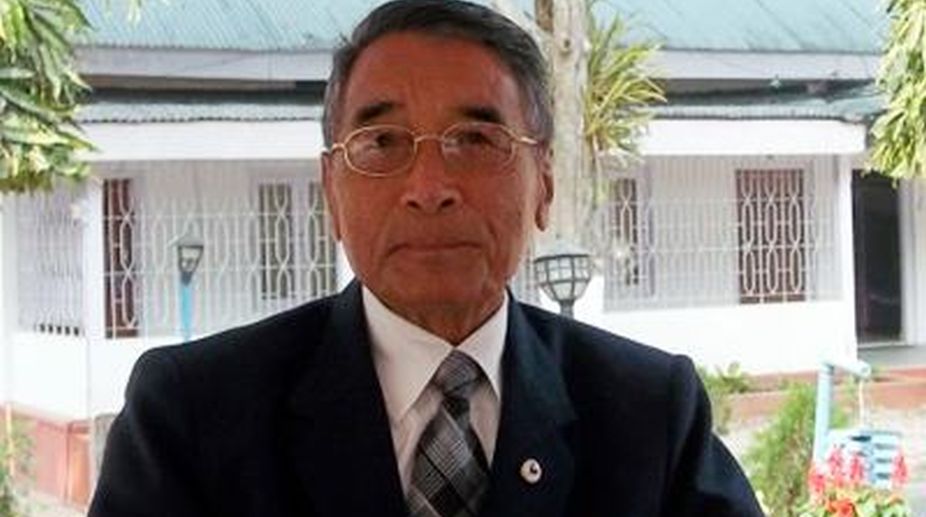Success, students of political science can often say, is never an orphan. Many vie for the credit of having fathered it. But failure is a born orphan and in most cases, none would own it up. The exit of 81-year-old Nagaland chief minister Shurhozelie Liezietsu into oblivion in a rather unceremonious manner is certainly an episode where success and failure ought to be debated.
The change of guard in Nagaland has taken place yet again. The downfall of Shurhozelie after being in the hot seat for five months, was practically without political reasons as the elected members of the legislative assembly, decided that they must get back TR Zeliang as their chief minister one fine morning.
Zeliang had to step down following protests over holding of urban civic poll last February with 33 per cent reservation for women and this despite stiff opposition from tribal bodies. So what changed in the last six months?
Apparently, the Zeliang camp did not appreciate the fact that, after coming to power — as a non-MLA — Shurhozelie was only playing a bigger game, albeit in tandem with his legislator son Khriehu Liezietsu.
In fact, the rebellion started in May itself. Hardly three months after Zeliang resigned, Naga People’s Front legislator Khriehu Liezietsu gave up the Northern Angami I Assembly seat to pave the way for his father, chief minister Shurhozelie Liezietsu to become an elected legislator. The by-election was slated for 29 July. The Zeliang camp saw it as an act of betrayal as, apparently, it was agreed between Zeliang and Shurhozelie that the latter would quit in due course of time and hand over the charge to Zeliang.
But the other side has rejected the allegation and said that Zeliang fell prey to the conspiracies hatched by anti-NPF forces. Reports say Zeliang had worked out a deal with three-time elected chief minister Neiphiu Rio who had floated the new Democratic Progressive Party. The lone Lok Sabha MP from Nagaland, Rio was not happy with the goings on in the NPF and maintained that frequent defections by legislators, especially since 2014, had tarnished the image of the party.
Incidentally, the developments, including the sharp attack on his own party by Rio and at the same time, Zeliang deciding to back the move to oust chief minister Shurhozelie, also coincided with the formation of the DPP.
That opened the doors for all who "aspire to work for the people and are willing to make efforts towards resolution of the political conflict". Many see this appeal from the DPP as both timely and strategic. This could possibly mean the weakening of the NPF as a regional force.
In Nagaland, despite a history of long-term Congress rule, regional forces have been quite influential and there had been always a room for a strong regional entity. In this context, it is worth mentioning that in the 1970s, the United Democratic Front was a major anti-Congress plank and leaders associated with it, like the late former chief minister Vamuzo Phesao, were jailed, during the Emergency.
The regional forces then took different names from time to time, like Naga National Democratic Party, Naga People’s Council, Nagaland People’s Party and Nationalist Democratic Movement. In all this it is crucial to note that Shurhozelie has remained a key regional politician with a clear anti-Congress stance for three to four decades. Otherwise politicians like Rio and Zeliang had earlier been flag- bearers of the Congress and both had worked under the mentorship of veteran S C Jamir, who is now the governor of Odisha.
Shurhozlie, along with Vamuzo and Vizol Angami (both former chief ministers) actually formed the regional triumvirs and they never joined the Congress formally. With Vizol and Vamuzo no more, Shurhozelie, till the other day, was the last surviving "regional politician" who, however, from time to time struck good working relations with renowned anti-Congress leaders at the national level. Vamuzo was a great friend of George Fernandes for a long time.
Even as in the earlier regional avatars also the anti-Congress plank in Nagaland had given some chief ministers like Vizol, JB Jasokie, KL Chishi and Vamuzo, it was only Rio who made the regional NPF humble the Congress in the 2013 assembly election. In what is called the worst ever performance by the Congress that year, its strength dwindled to eight in the 60-member house.
That practically started the Congress-free Nagaland and in a subsequent assembly by-election even veteran Jamir lost from the Aonglenden constituency. The dynamics of change have been working yet again. Therefore, when Rio, after 11 years of uninterrupted rule, quit to contest in the 2014 Lok Sabha election, Zeliang took over, albeit with the blessings of Shurhozelie.
It is said that from the very beginning Rio was against naming Zeliang as his successor. But the machinations of Jamir seemed to work. However, in a smart but nasty move for many Naga politicians, Zeliang has today cultivated a few key BJP leaders in New Delhi and hence the action plans were charted out very cautiously.
Apparently, the sidelining of Rio was complete. But in February this year when Zeliang tried to conduct the urban civic poll election with 33 per cent reservation for women despite opposition from different tribal bodies and violence erupted, Rio thought it was time to return to state politics as he was not happy being a mere MP without any central cabinet post. He had apparently given up the chief ministership with the hope of becoming an MP and also a minister in the Centre. Rio reportedly tried to replace Zeliang when dissidents demanded the latter’s ouster. Things could have gone in his favour over the last few months but Shurhozelie played a last-minute game. That way he came to power. But that power itself has turned into his nemesis.
Thus, Shurhozelie’s unceremonious exit certainly leaves a vacuum in the regional and hardcore anti-Congress polity of Nagaland. But then, who will have the last laugh?
The writer is a New Delhi-based freelance contributor.












